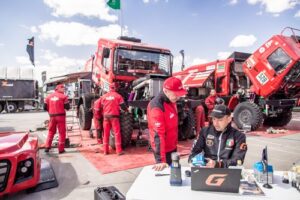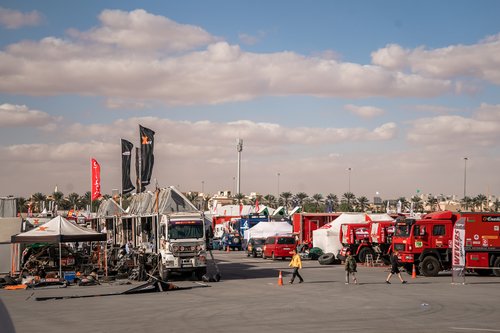Today, the DAKAR participants have an official rest day. Exactly half of the stages is behind – six out of twelve – there are six more ahead. It’s time to take a breath.
The rest day bivouac is located in Riyadh, the capital of Saudi Arabia. The largest city in the kingdom is inhabited by almost 8 million people, and such a legendary sporting event as the DAKAR rally came here for the first time.
The first settlers appeared on the site of Riyadh four thousand years ago – they were nomadic Arabs. Years passed and now modern “nomads” arrived in Riyadh – a caravan of the DAKAR participants’ vehicles.
Many people think that the rest day falls exactly in the middle of the rally marathon distance, but this is not entirely true. According to the results of six days, the racers covered 2,383 kilometers of competitive distance, and its middle is 2,551 kilometers. So the DAKAR equator will be reached tomorrow during the seventh stage – approximately at the 168th kilometer of the special stage.
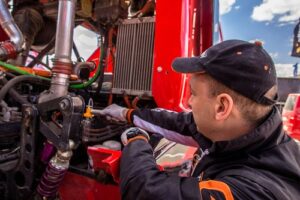
The rest day is such only from the sports point of view, that is, the special stages passage. Neither racers nor the technical staff of the teams have a rest in the literal sense of the word.
At the end of the sixth stage, the press representatives were informed that on the rest day large teams organize press entrances to their drivers and presentations. But this work is for racers and journalists.
The rally has changed its location from South America to the Arabian Peninsula, and here, in Saudi Arabia, participants continue to be amazed at the high quality of the service provided. DAKAR may lose its adventure spirit in terms of finding a hot shower or properly wiping one’s outfit. Today, “Catering of Saudi Arabia” has brought a mobile laundry to the bivouac, where everyone could hand over their belongings.
And what are the mechanics and engineers of the teams doing?
Work is in full swing in racing teams! Mechanics inspect trucks, cars, motorcycles and quads – it is necessary to carefully check all components and assemblies, to assess the wear degree of their parts and the components reliability; to replace some components in order to avoid possible technical problems in the future. Especially, since immediately after the rest day the participants will tackle the longest special stage of the DAKAR.
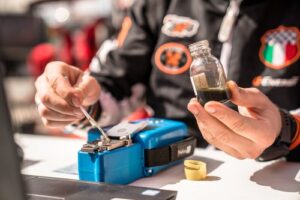
QUOTE:
Sergey Vyazovich, International Master of Motorsports of the Republic of Belarus, head of the MAZ-SPORTauto team, crew No. 503 driver,
“Today, on the rest day we change all the components, especially in my car. Just to be safe again. And for the rest of the vehicles, in principle, there is the same routine maintenance. The only thing: based on the oil research results, we decide whether to go deeper into the individual units repair and assess the wear degree. In the car that is in the TOP-3 now, the repair is done ahead of schedule, preventively in order to protect it.
How often do we change engine and transmission oils? I will say we stopped thinking about oil! I think this is an indicator that there are no problems with any unit. If we used to change one oil to another, constantly thought about its resource, now we just don’t think about it. There are routine works that need to be carried out based on the mileage of each part, and we simply carry them out. That’s all. When you least think of some assembly or material, it means it doesn’t cause you any problems. I think this is the best assessment of the lubricants performance
The G-Energy mobile laboratory specialists do not have time for rest also – they continue to conduct an extensive research program to provide the MAZ-SPORTauto team engineers and mechanics with detailed information about the internal state of the units working with G-Energy products.
After six racing days, all the components and assemblies of the trucks are working as usual. Oil copes with harsh operating conditions. There is a uniform dynamics of changes in the physicochemical parameters of the product and at the moment the oils have a margin of performance. Nevertheless, on the rest day the oils change is made in all units according to the team regulations.
WHAT PARTICIPANTS WILL FIND TOMORROW
The seventh stage of the rally marathon from Riyadh to Wadi Al-Dawasir will be the longest for the entire race – this is the first of two special stages of the current DAKAR, the distances of which will exceed 500 kilometers. There will be two such stages – the seventh, with a length of 546 kilometers, and the tenth, with a length of 534 kilometers.
Tomorrow the participants will tackle not only the longest, but also the most diverse stage. They will have to overcome sands, dunes, and off-road. At the same time, navigation will again be complicated by a large number of randomly located tracks – it will not be easy for co-drivers to find the right route
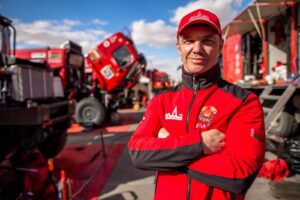
THIS IS INTERESTING:
Over the past six stages of DAKAR, several conclusions on the lubricants operation can be made. Forexample, about gear oil that works in wheel reduction gears of front axle. Previously, according to the team regulations, oil in these nodes changed after each racing day. This was common, because this gearbox is the most loaded unit in a racing truck. There is a small crankcase volume and a small amount of working oil – less than half a liter. Heavily loaded gears of a wheel gearbox, directly transmitting torque to the drive wheels, heat the oil strongly with their friction; it is also warmed up by the heat coming from the brake mechanisms. One of the oil tasks is to cool the friction pairs without losing their lubricating properties. Due to the described reasons, transmission oil in wheel reduction gears should “age” much more intensively than in other transmission units.
An analysis carried out over these days showed that it is not advisable to change oil after every stage. The product works and can maintain its effective qualities not only during one stage, but during several of them – two, or even three. Now the optimal replacement interval that the mobile laboratory recommends adhering to is every two stages. Thus, it is possible to reduce the load on the MAZ-SPORTauto team mechanics. They will be able to spend this time on other work on servicing vehicles and their units, and perhaps even on the most valuable thing that everyone lacks in multi-day marathon races – sleep and rest.
